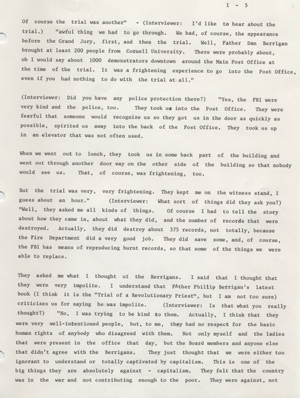 |
Burning of draft board records by Philip and Daniel Berrigan and others, May 17, 1968: an interview with Mary E. Murphy given on November 2, 1972
 |
7 / 15 |
 |



| Collection: |
Friends of Catonsville Library |
| Date: |
1972-11-02 |
| Date of Digitization: |
2004-03-29 |
| Source: |
Catonsville Library |
| Original Dimensions: |
28 x 22 cm |
| Creator: |
Murphy, Mary E. |
|
|
Notes:
This a transcript of a recorded interview with Mrs. Mary E. Murphy who was the Chief Clerk at the Draft Board office no. 33 at the time of the event of the forceful removing and burning of the draft cards by the Catonsville Nine group.
Transcription: Of course the trial was another" - (Interviewer: I'd like to hear about the
trial.) "awful thing we had to go through. We had, of course, the appearance
before the Grand Jury, first, and then the trial. Well, Father Dan Berrigan
brought at least 200 people from Cornell University. There were probably about,
oh I would say about 1000 demonstrators downtown around the Main Post Office at
the time of the trial. It was a frightening experience to go into the Post Office,
even if you had nothing to do with the trial at all."
(Interviewer: Did you have any police protection there?) "Yes, the FBI were
very kind and the police, too. They took us into the Post Office. They were
fearful that someone would recognize us so they got us in the door as quickly as
possible, spirited us away into the back of the Post Office. They took us up
in an elevator that was not often used.
When we went out to lunch, they took us in some back part of the building and
went out through another door way on the other side of the building so that nobody
would see us. That, of course, was frightening, too.
But the trial was very, very frightening. They kept me on the witness stand, I
guess about an hour." (Interviewer: What sort of things did they ask you?)
"Well, they asked me all kinds of things. Of course I had to tell the story
about how they came in, about what they did, and the number of records that were
destroyed. Actually, they did destroy about 375 records, not totally, because
the Fire Department did a very good job. They did save some, and, of course,
the FBI has means of reproducing burnt records, so that some of the things we were
able to replace.
They asked me what I thought of the Berrigans. I said that I thought that
they were very impolite. I understand that Father Phillip Berrigan's latest
book (I think it is the "Trial of a Revolutionary Priest", but I am not too sure)
criticizes us for saying he was impolite. (Interviewer: Is that what you really
thought?) "No, I was trying to be kind to them. Actually, I think that they
were very well-intentioned people, but, to me, they had no respect for the basic
human rights of anybody who disagreed with them. Not only myself and the ladies
that were present in the office that day, but the Board members and anyone else
that didn't agree with the Berrigans. They just thought that we were either too
ignorant to understand or totally captivated by capitalism. This is one of the
big things they are absolutely against - capitalism. They felt that the country
was in the war and not contributing enough to the poor. They were against, not
|




